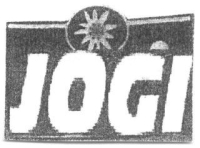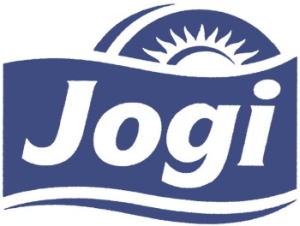CLASS 46
Now in its twelfth year, Class 46 is dedicated to European trade mark law and practice. This weblog is written by a team of enthusiasts who want to spread the word and share their thoughts with others.
Want to receive Class 46 by email?
Click here subscribe for free.
Click here subscribe for free.
Who we all are...
FRIDAY, 17 SEPTEMBER 2010
Poland: the Supreme Court speaks on copyrights and trade marks
 The Polish company KREA sp. z o.o. prepared a label design for yoghurt packaging that was commissioned by Wojciech Jurkiewicz. The Company contacted a freelance graphic deisgner to create word-figurative trade mark, which was to be placed on this packaging. KREA acquired all copyrights. Wojciech Jurkiewicz filed for trade mark registration but the PPO refused to grant the right of protection. Mr Jurkiewicz was also sued by KREA and the District Court ordered the defendant to cease the copyright infringement of economic rights owned by KREA to the word-figurative trade mark JOGI by deisisting from using of the sign in any form in the course of economic activity and ordered Mr Jurkiewicz to pay 51.000 PLN. The Appelate Court changed the judgment only by reducing the amount awarded to 15.000 PLN.
The Polish company KREA sp. z o.o. prepared a label design for yoghurt packaging that was commissioned by Wojciech Jurkiewicz. The Company contacted a freelance graphic deisgner to create word-figurative trade mark, which was to be placed on this packaging. KREA acquired all copyrights. Wojciech Jurkiewicz filed for trade mark registration but the PPO refused to grant the right of protection. Mr Jurkiewicz was also sued by KREA and the District Court ordered the defendant to cease the copyright infringement of economic rights owned by KREA to the word-figurative trade mark JOGI by deisisting from using of the sign in any form in the course of economic activity and ordered Mr Jurkiewicz to pay 51.000 PLN. The Appelate Court changed the judgment only by reducing the amount awarded to 15.000 PLN.
KREA also filed a suit against OBORY sp. z o.o., claiming copyright infringement of its word trade mark JOGI. The Company argued that the binding force of the judgment against Mr Jurkiewicz extends to a conclusion that JOGI word is deemed as a copyrightable work. The case went through all instances.
 The Supreme Court in its judgment of 22 June 2010 case file IV CSK 359/09 held that only the dictum is the binding element of a judgment, not its motives, therefore, the previous judgment has no expanded legitimacy. It was not a reasonable argument that the earlier cited judgment in case against Wojciech Jurczyński would always be the official confirmation of the plaintiff's copyright to a word sign. The SC ruled that the idea for the word "JOGI" (which existed previously in the public domain) as a designation for drinking yoghurt, is nothing creative or original. The approach presented by KREA, which lies almost on the presumption of fact that every product of human intellect is a protected copyrightable work, without demonstrating of its creative elements, has no support in the Polis Act on Author's Rights (ARNR) and was too far reaching. In a wider perspective, such conclusion would be the risk of depreciation of the concept of creativity in general.
The Supreme Court in its judgment of 22 June 2010 case file IV CSK 359/09 held that only the dictum is the binding element of a judgment, not its motives, therefore, the previous judgment has no expanded legitimacy. It was not a reasonable argument that the earlier cited judgment in case against Wojciech Jurczyński would always be the official confirmation of the plaintiff's copyright to a word sign. The SC ruled that the idea for the word "JOGI" (which existed previously in the public domain) as a designation for drinking yoghurt, is nothing creative or original. The approach presented by KREA, which lies almost on the presumption of fact that every product of human intellect is a protected copyrightable work, without demonstrating of its creative elements, has no support in the Polis Act on Author's Rights (ARNR) and was too far reaching. In a wider perspective, such conclusion would be the risk of depreciation of the concept of creativity in general.
The Court held that in principle, a single word, not only these taken from everyday language, but also the unknown words or neologisms, do not have the characteristics of creativity. Only one-word titles, or slogans, may be exemption to the aforemtnioned rule when applied to specific situations, i.e. when they are characterized by a startling clarity and brilliance, make poetic of the whole work, are the "key" to understanding of such work. The Polish legal doctrine and case law have long since stopped using the term "pure art" and promoting the traditional cultural role, which the right had to serve. The concept of "copyright work" is recognized widely, with persistent tendency to mitigate the criteria governing the granting of copyright protection, such as creativity, originality and individuality. The evidence of such actions is presented in the protection of the products of which contain a small contribution to creative work, and characterized by even a small degree of originality and individuality. In this context, the concept of "boundary categories of works" is used and also - in principle - the possibility of granting copyright protection to small products of human activity that are designed for purely utilitarian and practical use, is not denied.
The ARNR protects works created not only for artistic purposes and does not refuse the protection for works created solely for commercial (industrial, merchandising) purposes, but only in so far as the work has such characteristics that are required for any other copyrightable work. The utilitarian purpose of copyrightable works, created solely for the intended use in a certain way, is typical for the objects that are subject to industrial property rights, in particular industrial designs and trade marks In the case of the latter it most often applies to word-figurative trade marks. In Polish law it is permissible to accumulate of certain intangible property/econimic rights, including trademarks being also copyrightable works and industrial designs/copyrightable works.
In the opinion of the Supreme Court, the mere use of a word as a trade mark should not affect the possibility of its recognition as a copyrightable work, since the existence of such work cannot depend on its specific purpose. The way of using a given work does not decide on the statusu of its copyrightability. The word "JOGI" does not show originality, which could allow for an exception to the generally accepted principle that single words do not have creative characteristics. It has no autonomous characteristics of the copyrightable work, and it isn't a copyrightable work because of someone "invented" a particular way of its use as a trade mark, or designation of a particular type of goods originating from a particular undertaking. Posted by: Tomasz Rychlicki @ 18.13
Tags: Polish Supreme Court. trade mark rights, copyright infringement, copyrightable subject matter, threshold of creativity,


 Sharing on Social Media? Use the link below...
Sharing on Social Media? Use the link below...
Perm-A-Link: https://www.marques.org/blogs/class46?XID=BHA2015
Poland: the Supreme Court speaks on copyrights and trade marks
KREA also filed a suit against OBORY sp. z o.o., claiming copyright infringement of its word trade mark JOGI. The Company argued that the binding force of the judgment against Mr Jurkiewicz extends to a conclusion that JOGI word is deemed as a copyrightable work. The case went through all instances.
The Court held that in principle, a single word, not only these taken from everyday language, but also the unknown words or neologisms, do not have the characteristics of creativity. Only one-word titles, or slogans, may be exemption to the aforemtnioned rule when applied to specific situations, i.e. when they are characterized by a startling clarity and brilliance, make poetic of the whole work, are the "key" to understanding of such work. The Polish legal doctrine and case law have long since stopped using the term "pure art" and promoting the traditional cultural role, which the right had to serve. The concept of "copyright work" is recognized widely, with persistent tendency to mitigate the criteria governing the granting of copyright protection, such as creativity, originality and individuality. The evidence of such actions is presented in the protection of the products of which contain a small contribution to creative work, and characterized by even a small degree of originality and individuality. In this context, the concept of "boundary categories of works" is used and also - in principle - the possibility of granting copyright protection to small products of human activity that are designed for purely utilitarian and practical use, is not denied.
The ARNR protects works created not only for artistic purposes and does not refuse the protection for works created solely for commercial (industrial, merchandising) purposes, but only in so far as the work has such characteristics that are required for any other copyrightable work. The utilitarian purpose of copyrightable works, created solely for the intended use in a certain way, is typical for the objects that are subject to industrial property rights, in particular industrial designs and trade marks In the case of the latter it most often applies to word-figurative trade marks. In Polish law it is permissible to accumulate of certain intangible property/econimic rights, including trademarks being also copyrightable works and industrial designs/copyrightable works.
In the opinion of the Supreme Court, the mere use of a word as a trade mark should not affect the possibility of its recognition as a copyrightable work, since the existence of such work cannot depend on its specific purpose. The way of using a given work does not decide on the statusu of its copyrightability. The word "JOGI" does not show originality, which could allow for an exception to the generally accepted principle that single words do not have creative characteristics. It has no autonomous characteristics of the copyrightable work, and it isn't a copyrightable work because of someone "invented" a particular way of its use as a trade mark, or designation of a particular type of goods originating from a particular undertaking. Posted by: Tomasz Rychlicki @ 18.13
Tags: Polish Supreme Court. trade mark rights, copyright infringement, copyrightable subject matter, threshold of creativity,


 Sharing on Social Media? Use the link below...
Sharing on Social Media? Use the link below...Perm-A-Link: https://www.marques.org/blogs/class46?XID=BHA2015
Reader Comments: 0
Post a Comment
MARQUES does not guarantee the accuracy of the information in this blog. The views are those of the individual contributors and do not necessarily reflect those of MARQUES. Seek professional advice before action on any information included here.
The Class 46 Archive

